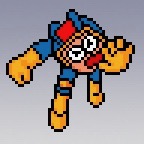deleted by creator
I’m just going to call myself an artist of new media types and end it there.
I give people rides in my horse and buggy in exchange for cash and sometimes barter.
You could actually do better, I think. You drive a carriage for hire, but It’s equipped with something like a (fire powered) water wheel so it doesn’t need horses.
Edit: It also might be of interest to them that ordinary people can afford your services. In their time schmucks walked.
True. My creativity doesn’t come out with story telling like this. My creativity is more of the MacGyver type.
That’s probably for the best. When’s the last time this situation came up? Haha.
I think so? Libraries certainly existed, so there’s that. Workshops existed, even if they were less industrialized/more artisanal. The only novelty might be that the two should be in the same place.
Then again, libraries of old apparently were used for a lot more than just books/scrolls, and trade guilds must have needed written materials often enough… Maybe the modern makerspace is a reinvention of an old concept? I have no idea.
Well, my job showed up around then. So they would know the term Millwright, but the modernisation would probably make them a little incredulous.
I’m a “blacksmith” using advanced machinery to aid in the process.
They had pretty good clocks already, so maybe you could describe it in those terms.
I wait tables, so, yeah.
Ah, a bar wench!
LOL c’mon
I work for a training department for a large financial institution. I think I could explain it as teaching people how to do their job better. Though I don’t actually do much teaching, personally.
I’m currently in college to go into GIS (Geographic Information Systems/Science) and lemme tell ya I think more people in 1700 would understand “cartographer” than they would today.
deleted by creator
You are correct. People these days are idjits.
Not even really that but people tend to think that others have just outright stopped making maps. “Haven’t we made all the maps already?” Is a common response I get when I tell them. They seem to forget about data analysis and all that.
We have these things that are like stained glass books and I make how the glass looks.
Front-end developer.
I build buildings
I make a long list of things for people to do in order to create a final outcome, and then keep track of the progress and find solutions for deviations.
Project manager.
They never really called it that, but I’m pretty sure the concept isn’t new. Architects and the likes did pretty much the same when building ginormous structures back in ancient Rome and Egypt, so they’d get the idea. Probably wouldn’t understand the project deliverable, but at least the process.
I (a software engineer) am a high magician who fixes the spells other high magicians put into the magic box ages ago because the king wants them to do something other than whay they were originally designed to do.
That’s the point they burn you at the stake for being a witch.
Well, if they weigh the same as a duck
Folks in 1700 understood what an engineer was. I’d just tell them I design really complicated looms.
Can you get it to draw bewbs? Asking for a friend
I’d avoid magic on that one, since modern ideas about how magic works are pretty influenced by technology now. I suspect this would be gibberish to them.
How about “we have machines so complicated that it’s hard to set them, and my job is to try to change the settings on them and usually fail”?
I’d go by ‘mechanical devices’, there were hardly any machines in our understanding back then.
Well, they did have clocks, even some early portable ones, and “automata” which were a bit like modern animatronics. Power applications like mills, too. I don’t know what word would work best, though.
I’m guessing they’d picture OP running around a giant room filled with clockwork, going at things with a pry bar and wedges. That is a bit like how computers worked in their first decade, albeit electrically rather than mechanically. Later in the 18th century they invented the punchcard loom, so that would be a good point of reference, but we’re all the way back in 1700.
Worth noting that the 1700s are, in fact, the 18th century. The first century was the years from 1-100, the second century from 101-200, etc.
But, yes. It was invented later in the 18th century than our audience came from.
Also a good point. It’s dumb that we’ve zero-indexed centuries and then given them one-indexed names, but that is the standard.
Well, it’s just how math and numbers in English work.
Cardinal numbers, the number of things you have, start with zero because you can have none of something (or less with negatives, but that’s neither here nor there).
Original numbers, Numbers that show which things were in what order (first, second, etc) start at one, because you can’t really have a zeroth something because then it would really be the first one.
So year 1 is 1 because it’s the first year, and it starts the first century. It would have been entirely possible for English to make the names a little nicer, but given that it isn’t, the math means the first set of one hundred years are the years before the one-hundredth year and cetera.
I mean, zeroth would still be zeroth; it’s just based on the cardinal the moment before it arrived rather than after, assuming you start with nothing and add objects. Unfortunately that’s not conventional, probably in any language, and so you get a situation where a positional notation clashes with how we want to talk about the larger divisions of it casually. This sort of thing is exactly why computer science does use zero indexing.
Relatedly, there was also no year 0; it goes straight from 1 BC to 1 AD.
deleted by creator
It is a thinking engine. No further questions.
Not sure if the concept of “settings” would be something they can relate to.
I was wondering about that too. I think they had adjustable tools in common use, but I could be wrong. They might have also used a different word when changing the depth “setting” of their horse-drawn plow, although “to set” has got to be a pretty old verb.
Yeah, something like “We have machines with thousands of switches that can do complicated things depending on how you set the switches. My job is flipping those switches so the machine performs the desired task as best as possible”…?
“what is this ‘switch’ of which thou speakest?”
A lever that influenced the workings of the machine, sir.
I was trying to figure out a way to describe the interface to 1700’s people, given that all the machines they have require very up-close manipulation of the mechanisms to alter. My best guess is as a table covered in triggers like on a crossbow, but that reset themselves. You can tell what they’re doing with a sort of scroll that comes out with stamps on it. That’s still more like a 1970’s dumb terminal than a laptop, but I don’t want to try and describe screens or cursors before I can make sure they understand the concept that not all machines have to be mechanical, which I don’t think would be clear to them automatically.
I’m guessing at that point it sounds weird and alienating to them, and they might actually think their job as a peasant seems less depressing, especially if I bring up punctuality requirements compared to the 1700’s, where meetings would wait days for someone. White-collar work is better once you can understand what’s happening abstractly, or at least is for me, but no hard deadlines for anything does indeed sound great. They also may have gotten winters off, depending on latitude.
Even better: “our clocks in the future are very complex and it’s my job to keep them working”.
That would be more a like a sysadmin, though. OP has to introduce new functionality, which I’d want to emphasise.
They could say they’re a creator of automata, and the past people would picture basically robots, but that implies a more physical type of building, and also that they create things that are purely decorative or for entertainment.
We got this sand and tought it to do math. I give the math sand very specific instructions to do a task. There are many people like me, and a good chunk of them are giving the sand instructions to show silly cat pictures.
I wonder if it would be better to go with sand, or a new metal, given that the average person in 1700 would know the process of smelting ore better than most of the people here. Either way they’re not going to see the point without some explanation, because they’d think it’s easy enough just to draw a cat yourself.
If someone working in semiconductor manufacturing were to answer this question they would probably have to say “I make sand think” and just walk away.
“You know how we dug out that trench to let some of the river through for irrigation, and then we fill it in for winter? Yeah I do that, but much smaller, and much faster, on sand. Got a shovel?”
Not much different than weirder than meat thinking.
For the uninitiated: https://www.mit.edu/people/dpolicar/writing/prose/text/thinkingMeat.html
I’m a programmer. I think I would explain it as creating and operating mechanical contraptions that help students find books to read and help them write new works and send them to professors. I work at a university and that is basically what our program does.













